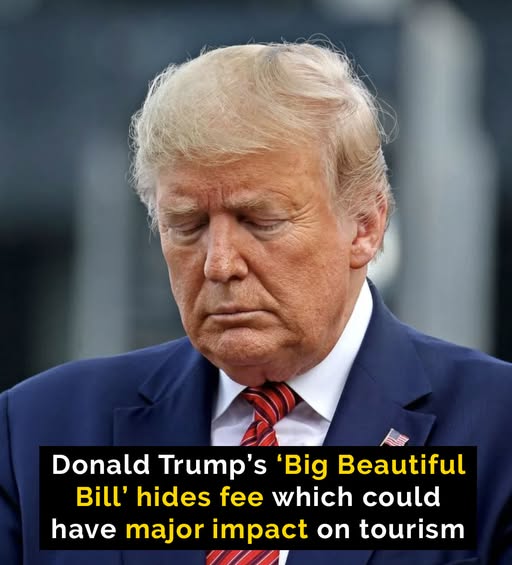
A newly signed legislative package by former President Donald Trump is drawing attention—not only for its high-profile tax changes, but also for a new visa-related fee that experts say may significantly impact the U.S. tourism industry.
Nicknamed the “One Big Beautiful Bill,” the sweeping legislation includes no federal taxes on tips, expanded child tax credits, reductions in certain health program costs, and temporary tax breaks for older Americans. However, a lesser-known provision—called the visa integrity fee—is beginning to raise questions.
Hidden Fee Raises Tourism Concerns
While the bill has been praised by supporters for supporting working families and reforming parts of the tax code, travel and economic analysts warn that the added visa cost could affect international visitation to the U.S.—a sector already under strain.
According to Oxford Economics, foreign visitor spending in the U.S. is expected to fall by $8.5 billion in 2025, citing changing global perceptions related to travel and immigration. The World Travel & Tourism Council projects an even sharper potential drop—an estimated $12.5 billion decline—which could have ripple effects on local economies and travel-related businesses across the country.
What Is the Visa Integrity Fee?
The visa integrity fee applies to travelers who are not eligible for the Visa Waiver Program (VWP) and are seeking non-immigrant visas for tourism, business, or study. For the 2025 fiscal year (Oct. 1, 2024 – Sept. 30, 2025), the fee begins at $250, though the Secretary of Homeland Security may adjust this amount, including for inflation.
This fee comes on top of existing visa application costs and the updated Form I-94 fee, which recently increased from $6 to $24.
Officials say the purpose of the new fee is to help improve compliance with visa terms and reduce overstays. However, some in the travel industry believe the fee could discourage international visitors due to higher upfront costs and uncertainty around the refund process.
Industry Leaders Express Concern
While the bill includes tax incentives designed to stimulate the economy, travel industry experts are urging caution.
“Cost and visa wait times are already among the top concerns for those considering travel to the U.S.,” said Erik Hansen, senior vice president at U.S. Travel. “The new fee raises those costs by over 140% without addressing delays in processing times.”
Others note that although the fee may be refundable under certain conditions, the process for doing so remains unclear.
“If travelers are eligible to get the fee back, that’s helpful—but the process isn’t fully explained yet,” said Steven A. Brown, an immigration attorney based in Houston. “That kind of uncertainty may influence travel decisions.”
No Timeline Yet for Implementation
As of now, the Department of Homeland Security has not released a detailed implementation plan, leaving questions about how and when the fee will be charged—and under what circumstances it might be refunded.
A spokesperson for the U.S. Travel Association added that this lack of clarity has created “significant challenges” for the industry as it tries to prepare for changes that could affect international bookings and long-term planning.
Who Is Exempt?
Citizens of countries included in the Visa Waiver Program will not be subject to the new fee. These countries include:
Andorra, Australia, Austria, Belgium, Brunei, Chile, Croatia, Czech Republic, Denmark, Estonia, Finland, France, Germany, Greece, Hungary, Iceland, Ireland, Israel, Italy, Japan, Latvia, Liechtenstein, Lithuania, Luxembourg, Malta, Monaco, Netherlands, New Zealand, Norway, Poland, Portugal, Qatar, San Marino, Singapore, Slovakia, Slovenia, South Korea, Spain, Sweden, Switzerland, Taiwan, United Kingdom.
Travelers from these nations can continue to visit the U.S. for up to 90 days for tourism or business without needing to apply for a traditional visa.
As the global travel community evaluates the impact of the new legislation, many are watching closely to see how the visa integrity fee will affect tourism, education, and business-related travel in the coming year.
What are your thoughts on this new travel policy? Let us know in the comments, and don’t forget to share this story to keep others informed.



